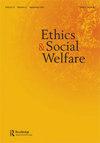妇女卖淫的污名和服务。基于社区的参与式研究结果
IF 0.9
Q4 SOCIAL WORK
引用次数: 1
摘要
摘要本文介绍了英格兰东北部一个以社区为基础的性工作者参与性研究项目的研究结果。这项研究包括对26名在公共场所和/或私人公寓或网上进行性交易的女性进行同伴主导的采访。还采访了社区利益攸关方。本文以当地提供服务以及与警方和刑事司法系统的互动为重点,记录了污名如何影响性工作者在当地提供服务和与当地刑事司法机构互动的经历。尽管那些在公共和私人场所出售性服务的人描述了与当地服务提供者的不同互动和经历,但污名化仍然是所有性工作者经历中普遍存在的主要特征。在这项研究中,那些“在街上”贩卖性行为的人描述了公众污名化的影响,而那些“在街头”贩卖性生活的人则描述了使用身份管理策略来避免性工作污名化带来的社会后果。在这篇文章中,我们探讨了如何通过英格兰和威尔士目前对性工作的治理来构建服务提供,以及如何通过性工作者为性工作者设计的服务来挑战性工作的污名。本文章由计算机程序翻译,如有差异,请以英文原文为准。
Stigma and Service Provision for Women Selling Sex. Findings from Community-based Participatory Research
ABSTRACT This article presents findings from a community-based participatory research project undertaken with sex workers in North East England. The research included peer-led interviews with 26 women who sell sex in public spaces and/or from private flats or online. Community stakeholders were also interviewed. Focusing on local service provision and interactions with the police and the criminal justice system, this article documents how stigma frames sex worker’s experiences of local service provision and interactions with local criminal justice agencies. Although those selling sex in public and private spaces described different interactions with, and experiences of, local service providers, stigma remained a pervasive and dominant feature of all sex worker’s experiences. In the research, those selling sex ‘on street’ describe the impact of public stigmatisation while those selling sex ‘off street’ describe employing strategies of identity management to avoid the social consequences of sex work stigma. In this article, we explore how service provision is constructed through the current governance of sex work in England and Wales, and how sex work stigma could be challenged through service provision designed by sex workers, for sex workers.
求助全文
通过发布文献求助,成功后即可免费获取论文全文。
去求助
来源期刊

Ethics and Social Welfare
SOCIAL WORK-
CiteScore
1.60
自引率
20.00%
发文量
36
期刊介绍:
Ethics and Social Welfare publishes articles of a critical and reflective nature concerned with the ethical issues surrounding social welfare practice and policy. It has a particular focus on social work (including practice with individuals, families and small groups), social care, youth and community work and related professions. The aim of the journal is to encourage dialogue and debate across social, intercultural and international boundaries on the serious ethical issues relating to professional interventions into social life. Through this we hope to contribute towards deepening understandings and further ethical practice in the field of social welfare. The journal welcomes material in a variety of formats, including high quality peer-reviewed academic papers, reflections, debates and commentaries on policy and practice, book reviews and review articles. We actively encourage a diverse range of contributions from academic and field practitioners, voluntary workers, service users, carers and people bringing the perspectives of oppressed groups. Contributions might include reports on research studies on the influence of values and ethics in social welfare practice, education and organisational structures, theoretical papers discussing the evolution of social welfare values and ethics, linked to contemporary philosophical, social and ethical thought, accounts of ethical issues, problems and dilemmas in practice, and reflections on the ethics and values of policy and organisational development. The journal aims for the highest standards in its published material. All material submitted to the journal is subject to a process of assessment and evaluation through the Editors and through peer review.
 求助内容:
求助内容: 应助结果提醒方式:
应助结果提醒方式:


